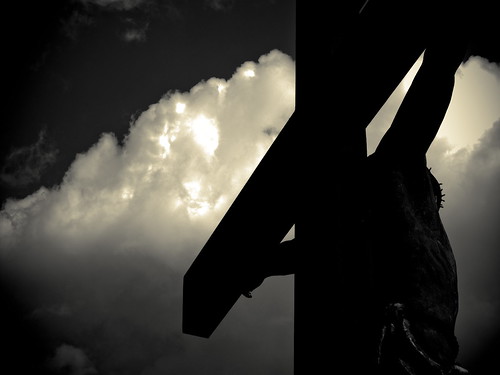We run our website the way we wished the whole internet worked: we provide high quality original content with no ads. We are funded solely by your direct support. Please consider supporting this project.
How NOT To Be Christ-Centered: A Review of God With Us – Part IV
In the first three parts of this review of Scott Oliphint’s God with Us we’ve outline his attempt to reframe all God’s accommodations in Scripture in light of the Chalecedonian Creed. He, in essence, uses the mysterious union of God and humanity in Christ to justify asserting that the immutable God can really become mutable in his interactions with humans. In this final section I’ll offer a critique of his proposal.
Oliphint has put forth an intriguing and very creative proposal that offers people in the classical tradition a new way of understanding divine accommodation. There are a number of features of Oliphint’s proposal that I think are commendable, the most significant being that his treatment of the portraits of God interacting with his people in a mutually influential relationship and even changing his mind in response to their input is a vast improvement over the traditional approaches that explained them as metaphorical anthropomorphisms or phenomenological descriptions. At the same time, I believe there are serious problems with Oliphints project. For our present purposes it will suffice for me to raise five of them.
First, while Oliphint correctly affirms that Christ is the quintessential revelation of God, it seems to me that his actual view of God has almost nothing to do with Christ. His view of God as he “exists in himself” is rather derived from the Reformed version of the classical tradition. Had Oliphint actually treated Christ as the quintessential revelation of God – as the one who reveals God’s very essence (hypostasis, Heb. 1:3) – it seems to me that he would have allowed him (instead of the Reformed tradition) to define God’s essence for us. And had he done this, I have trouble believing he would have concluded that God in his essence is pure act, devoid of potentiality, immutable, impassible, etc.
If our thinking was firmly fixed on the One in whom God became a human, how could we ever conclude that God in his essence does not, in any sense, become? And if our thinking was steadfastly oriented around the One in whom God suffered at the hands of others on the cross, how could it ever occur to us to imagine that God in his essence cannot be affected by anything outside himself and cannot in his essence have passions and suffer? Classical theologians arrive at this conception of God as he exists “in himself” because they drive a wedge between God as he exists in himself and God as he appears toward us. But this, I submit, is tantamount to denying that Christ is the quintessential revelation of God.
Second, and closely related to this, Oliphint assigns the change and suffering Christ experienced to God’s “covenantal attributes,” in contrast to his “essential attributes” as well as to God’s “person” in contrast to his “nature”. But the only reason Oliphant needs to make this distinction is because, rather than accepting that God’s essence is revealed in Christ, Oliphant presupposes a God whose essence is very different from what we find in Christ. Indeed, I submit that all the paradoxes – which I would argue are actually contradictions – that surround Oliphant’s proposal are due to the fact that he begins with a view of God that is defined in contrast to Christ rather than beginning with the God who is revealed in Christ.
Third, the way Christ actually functions in Oliphint’s reframing of divine accommodation is not as the quintessential revelation of God, but as the quintessential paradox (or contradiction) that justifies all the other paradoxes that arise when one superimposes an immutable and impassible God on the biblical narrative. His reasoning is that, since we presumably already accept the quintessential paradox of God becoming a real human, even though his humanity conflicts with his essential attributes (when defined along the lines of classical theism), then we ought not deny that God really takes on all the attributes ascribed to him in Scripture that also conflict with his essential attributes (when defined along the lines of classical theism).
I actually think Oliphint makes a strong case if you start with a God whose essential attributes are defined along the lines of classical theism. But this begs the question of why we should start with this conception of God in the first place. I rather submit that we should start with the one Oliphint agrees is the quintessential revelation of God and thus allow this revelation to inform us about God’s essential attributes. And as I’ve said, if we start here, I very much doubt we’d ever be inclined to define God’s essential attributes the way Oliphint and the classical tradition tends to do.
Fourth, I find it surprising, to say the least, that Oliphint could attempt to work out a Christ-centered model of accommodation and never once address any issue pertaining to God’s character, let alone discuss the self-sacrificial love of God revealed on Calvary. His sole interest is reconciling the metaphysical attributes of the classical view of God with the attributes of change, responsiveness and emotion ascribed to God in Scripture. I do not deny that there is a place for such metaphysical deliberations as we wrestle with God’s condescension in Scripture, but surely these concerns pale in importance compared to the need to reconcile the character revealed in Christ with the sub-Christ-like character of some of Scripture’s portraits of God. As should already be clear, the Cruciform Principle of Accommodation will be primarily focused on the manner in which God accommodates the limited and fallen framework of people by allowing himself to appear in ways that fall short of reflecting his true, loving character as revealed in Christ.
Finally, Oliphint writes as if the traditional interpretation of the Chalcedonian Creed is the only interpretation available. While he aptly wades through various debates surrounding different perspectives on this interpretation – e.g. he has excellent discussions of the “communicatio idiomatum” and “extra Calvinisticum” (e.g.143-45, 151) – Oliphint never considers the viability of a kenotic Christology. Without weighing in on the myriad of hotly contested issues surrounding this Christology, I would like to simply note that there are many orthodox theologians who embrace this Christology. And one of the main reasons they do so is precisely because it avoids the paradoxes – which most advocates of a Kenotic Christology regard as contradictions — that accompany the traditional interpretation of Chalcedon.
It’s of course understandable that Oliphint wouldn’t accept a kenotic Christology, for it is precisely the paradoxical nature of the traditional interpretation of Chalcedon that warrants his paradoxical view of the immutable God really taking on mutable qualities without setting aside his immutable nature. Yet, I would have thought the kenotic Christology at least deserved the courtesy of a refutation.
In any event, if one treats Christ as the quintessential revelation and therefore doesn’t presuppose the classical view of God’s essential attributes, and if one embraces a kenotic interpretation of the Chalcedonian Confession rather than the traditional interpretation, one doesn’t face the multitude of paradoxes that Oliphint finds in his Christology and in his Chalcedonian reframing of divine condescension. Even more importantly, if one commits to orientating all of their thinking about God around the Incarnate and Crucified Christ, I submit that they will arrive at a very different understanding of divine transcendence, and therefore of divine accommodation, than what is provided by Oliphint’s work and the classical tradition in general, as I will not attempt to demonstrate.
Category: Essays
Tags: Book Reviews, Classical Theism, Cruciform Theology, Essay, God With Us
Topics: Biblical Interpretation
Related Reading

How the Church is Tempted to “Do Good”
The previous post spoke of God’s call to the church to be resident aliens: a holy, distinct people who are set apart and peculiar when compared to the patterns of the world. The holiness of God’s kingdom is cruciform love, which constitutes our distinct witness to the world. Preserving this holiness and resisting the Devil’s…

Who is Responsible for Job’s Suffering?
In the prologue of the Book of Job, the author seems to ascribe the responsibility for Job’s affliction to Yahweh. For instance, Satan challenges God to “stretch out [his] hand and strike everything he has,“ believing that this would incite Job to curse God to his face (1:11). The fact that the Lord responds by…

Modern Theologians and the Centrality of Christ
During the twentieth century the development of a Christocentric reading of the Scriptures—which is crucial to understanding what I argue in Crucifixion of the Warrior God—surged in the wake of Karl Barth’s publication of his Romans commentary in 1916. It was justifiably described as a “bombshell” that fell “on the playground of the theologians,” demolishing…

Responding to Driscoll’s “Is God a Pacifist?” Part I
I’m sure many of you have read Mark Driscoll’s recent blog titled “Is God a Pacifist?” in which he argues against Christian pacifism. I’ve decided to address this in a series of three posts, not because I think Driscoll’s arguments are particularly noteworthy, but because it provides me with an opportunity to make a case against what I’ve…

The Cruciform Center Part 3: How Paul’s Epistles Reveal a Cruciform God
As we’ve discussed, the four Gospels point to a cruciform revelation of God (click here and here for a review), but what about the most widely read writer of the New Testament? What did the Apostle Paul have to say about how the cross reveals who God is? Before turning to Paul’s writings, I’d like…

What Is The Warfare Worldview?
Greg has written extensively on something he calls the Warfare Worldview. Many today believe that everything that takes place in the world is ultimately part of a divine blueprint and contributes in some way to the glory of God. As opposed to this view, Greg argues that wills other than God’s are responsible for evil…

